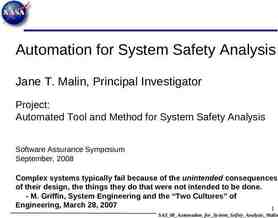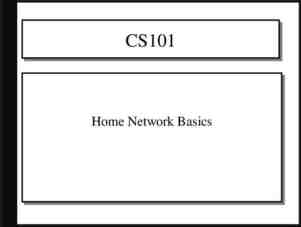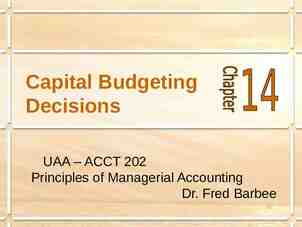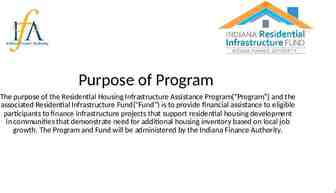Ethical Issues in Group Counseling by Tiffany Bates, M.A., LPC, LMFT,
19 Slides135.50 KB

Ethical Issues in Group Counseling by Tiffany Bates, M.A., LPC, LMFT, NCC, NCSC

Group Counseling In general, group counseling offers multiple relationships to assist an individual in growth and problem solving. In group therapy sessions, members are encouraged to discuss the issues that brought them into therapy openly and honestly. The counselor works to create an atmosphere of trust and acceptance that encourages members to support one another.

Objectives Give overview of ACA Code of Ethics for group counseling Discuss the ethical implications of group counseling Discuss the rights of group members Discuss the psychological risks of groups Discuss the group leader’s values Discuss specific case studies

ACA Code of Ethics, 2005 A.8. Group Work A.8.a. Screening Counselors screen prospective group counseling/therapy participants. To the extent possible, counselors select members whose needs and goals are compatible with goals of the group, who will not impede the group process, and whose well-being will not be jeopardized by the group experience.

ACA Code of Ethics, 2005 (cont.) A.8.b. Protecting Clients In a group setting, counselors take reasonable precautions to protect clients from physical, emotional, or psychological trauma.

ACA Code of Ethics, 2005 (cont.) B.4. Groups and Families B.4.a. Group Work In group work, counselors clearly explain the importance and parameters of confidentiality for the specific group being entered.

ACA Code of Ethics, 2005 (cont.) B.4.b. Couples and Family Counseling In couples and family counseling, counselors clearly define who is considered “the client” and discuss expectations and limitations of confidentiality. Counselors seek agreement among all involved parties having capacity to give consent concerning each individual’s right to confidentiality and any obligation to preserve the confidentiality of information known. For more information, refer to www.counseling.org, click on Resources, then Ethics.

Ethical Implications Which code to follow? “School counselors could possibly have a number of ethics documents with which they have agreed to comply. For example, a school counselor who is a member of the American School Counselor Association (ASCA) and the American Counseling Association (ACA), who is certified by the National Board of Certified Counselors (NBCC), and who is licensed by his or her state counseling licensure board has agreed to abide by four separate sets of ethical standards.” There are some variations in the different counseling ethical standards documents. Remley, T. & Huey, H. (2003). Ethical decision making and legal issues. In T.P. Remley, Jr., M.A. Hermann, & W. C. Huey (Eds.), Ethical & legal issues in school counseling (2 nd ed., pp. 5-20). Alexandria, VA: American School Counselor Association.

Informed Consent To encourage open and active participation from group members, it is the counselor’s responsibility to explain the client’s rights. Before Purpose Format, procedures and ground rules Group appropriate for client’s needs Limits of confidentiality The group process may or may not be congruent with the cultural beliefs and values of the group member

Informed Consent (cont.) During Right to leave the group if it isn’t what they expected or wanted Any research involved If the sessions are taped Processing information Freedom from group pressure Expectations

Involuntary group members Ethically, the counselor should inform clients of their rights and responsibilities and inform them of any possible consequences they may face if they elect not to follow treatment.

Reaction Remain alert to ways in which your personal reactions might inhibit the group process, and monitor your countertransference. Avoid using the group as a place where you work through your personal problems.

Case Example #1 A high school counselor secures permission from his principal to conduct group counseling sessions one night a week in an Internet chat room for students whose parents are going through a divorce. The principal asks the counselor to provide her with professional guidelines for counseling in this manner and to demonstrate how the procedures the counselor has developed comply with the professional standards. The counselor replies that since Internet counseling is so new, standards have not yet been adopted, but he assures the principal he will conduct the group sessions in a professional manner.

Response to Case Example #1 The ASCA standards require specifically that school counselors who communicate with clients on the Internet should follow the requirements in The Practice of Internet Counseling (National Board for Certified Counselors, 2001). The ACA code offers only general guidelines for the use of computers in counseling. However, ACA has also developed a separate document (that must be used in conjunction with the ACA ethics code) for Internet Counseling, Ethical Standards for Internet On-line Counseling (American Counseling Association, 1999)

Share your reaction about this video http://mediamatters.org/items/20060 5250011

Case Example #2 You are counseling a group of men that are addressing their sexuality. Some men in the group are openly gay and others are struggling with their identity. “Rob”, from the video you just watched, is one of the group members. He brings up ‘reparative therapy’ as a solution. A heated discussion ensues. You personally believe that no one is ‘born’ gay. What ethical implications can occur?

References Corey, G., William, G.T., Moline, M.E. (1995). Ethical and legal issues in group counseling. Ethics & Behavior, 5(2), 161183. Corey, G. (2000). Theory and practice of group counseling (5th ed.). Belmont, CA: Wadsworth. Cottone, R. & Tarvydas, V. (2003). Ethical and professional issues in counseling (2nd ed.). Upper Saddle River, NJ: Prentice Hall, pp. 332-342.

References (cont.) Kocet, M., (2006). Ethical challenges in a complex world: Highlights of the 2005 ACA code of ethics, Journal of Counseling & Development, 84(2), 228-253. Remley, T.P., Jr., Hermann, M.A., & Huey, W. C. (Eds.). (2003). Ethical & legal issues in school counseling (2nd ed.). Alexandria, VA: American School Counselor Association. Stein, R. (1990). Ethical issues in counseling. Buffalo, NY: Prometheus Books.

Any questions?






